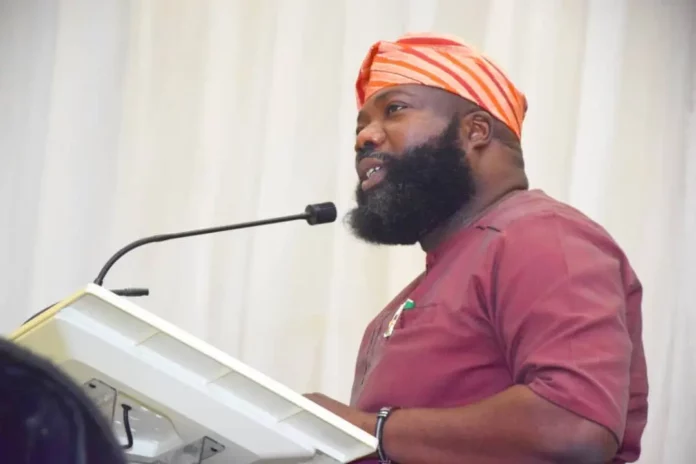The Oyo State Government has introduced a new regulatory framework for groundwater drilling across the state, pegging the cost of borehole drilling at N14,000 per metre. The move, according to the government, aims to ensure sustainable water access, regulate the industry, and eliminate arbitrary pricing by operators.
The announcement was made on Thursday during an interactive meeting held at the House of Chiefs, Secretariat, Ibadan, between the Ministry of Environment and Natural Resources and stakeholders in the borehole drilling and groundwater abstraction industry.
The Commissioner for Environment and Natural Resources, Abdulmojeed Mogbonjubola, said the administration of Governor Seyi Makinde is committed to ensuring access to clean and safe water for the people of Oyo State through practical and enforceable strategies.
Mogbonjubola stated that the newly fixed rate of N14,000 per metre for groundwater drilling would serve as a control price to curb exploitation and bring about fairness in the sector. He explained that the standardisation is part of the government’s efforts to create a more structured and transparent industry, especially for private citizens and communities looking to access potable water.
He said, “One of the key agendas of the present administration, led by Governor Seyi Makinde, is to provide potable water to the citizens of Oyo State using every feasible strategy. This is why the government has created a favorable environment for individuals who can afford to drill boreholes in their communities.”
The Commissioner added that the meeting with industry stakeholders was important in shaping the future of groundwater management in Oyo State and ensuring sustainable practices that protect the environment.
In a statement issued by the Commissioner for Information and Orientation, Dotun Oyelade, the government emphasised the importance of dialogue and collaboration with borehole drilling practitioners to develop long-term solutions and reduce the pressure on public water supply systems.
The Permanent Secretary of the Ministry of Environment, Sunday Ojelabi, in his welcome address, highlighted the vital role of water in human survival and the need for a structured system that ensures quality service delivery in the water abstraction industry.
“Water is life, and those who provide water bring life,” he said. “This meeting serves as a unique platform for collective brainstorming to support the people of the state.”
Ojelabi encouraged stakeholders to support the Makinde administration’s policies and work within the new regulatory framework to improve access to water, particularly in underserved communities.
An expert and groundwater consultant, Ajayi Richard, disclosed that 23 companies are currently registered and working with the Ministry of Environment, with 12 active drilling rigs operating across the state. He stressed the need for stronger partnerships between the government and practitioners to improve the efficiency and quality of borehole drilling services.
Also present at the meeting were key industry leaders, including Kolawole Olayinka, Chairman of the Association of Water Well Drilling Rig Owners and Practitioners, and Prof. Christopher Adeigbe, Chairman of the Nigerian Mining & Geosciences Society. They commended the government’s efforts to standardise operations and expressed readiness to work with the state in implementing the new regulations.
The stakeholders called for further engagement and support to ease the challenges in the field, including access to affordable equipment, standard training, and protection against unlicensed operators.
Borehole drilling has become a common method of water supply in Nigeria, particularly in states where public water systems are under pressure or non-functional. In many urban and rural parts of Oyo State, residents rely heavily on private boreholes for drinking, cooking, and other household uses.
However, the sector has largely operated without strong regulation, leading to varying prices, poor service quality, and environmental concerns such as over-extraction and water contamination. The new policy aims to introduce minimum standards and ensure that groundwater resources are managed responsibly.
Unregulated drilling has also raised fears of future water scarcity and damage to underground water tables. Experts have long warned that without guidelines, indiscriminate drilling could lead to a public health crisis and degradation of the environment.
The new pricing system and regulation are part of broader efforts by the state government to address these issues and ensure that borehole drilling is done professionally, affordably, and sustainably.
Some residents welcomed the government’s decision, saying it would protect people from being exploited by unscrupulous operators. “Last year, I was charged almost N20,000 per metre just to drill a borehole in my compound. At least now there’s a benchmark,” said Mr. Kehinde Adebayo, a resident of Ibadan.
Others, however, expressed concern about whether the new price will be enforced properly, especially in rural areas. “We hope the government won’t just announce this and leave us on our own. There should be monitoring teams to make sure people follow the rule,” said Mrs. Florence Ogunyemi, a trader in Ogbomoso.
The Oyo State Government says it plans to implement the policy in phases, starting with public awareness campaigns and continued dialogue with practitioners. Monitoring and enforcement mechanisms will also be introduced to ensure compliance with the N14,000 per metre control price.
The state has also promised to make the licensing process easier for borehole operators, and hinted at plans to provide technical training for drilling companies to improve service standards.
As climate change and population growth continue to put pressure on water resources across Nigeria, Oyo State’s move to regulate groundwater drilling could become a model for other states seeking sustainable solutions to water supply challenges.
The Commissioner concluded by reaffirming the administration’s commitment to water accessibility and environmental protection. “Governor Makinde’s goal is clear — to make water available, safe, and affordable to all,” he said.

